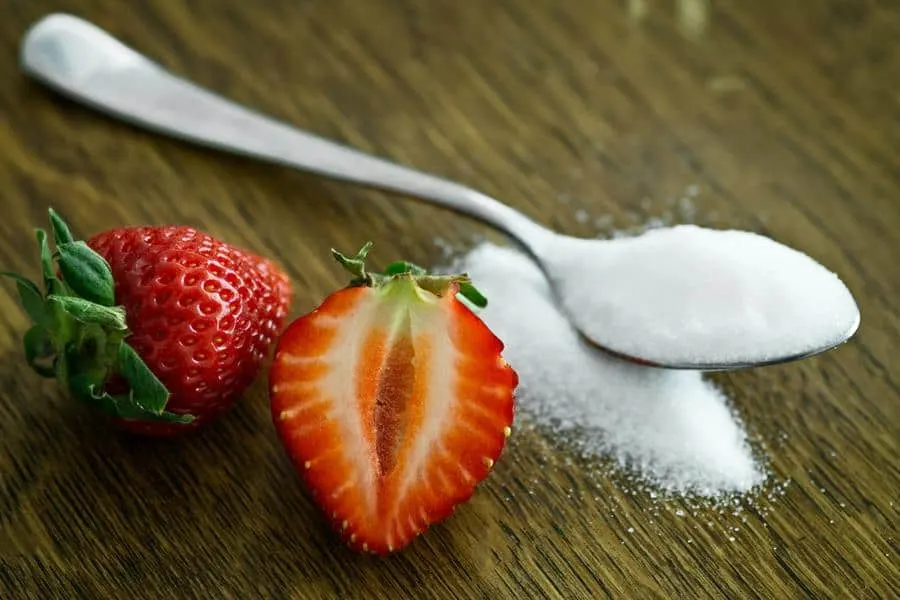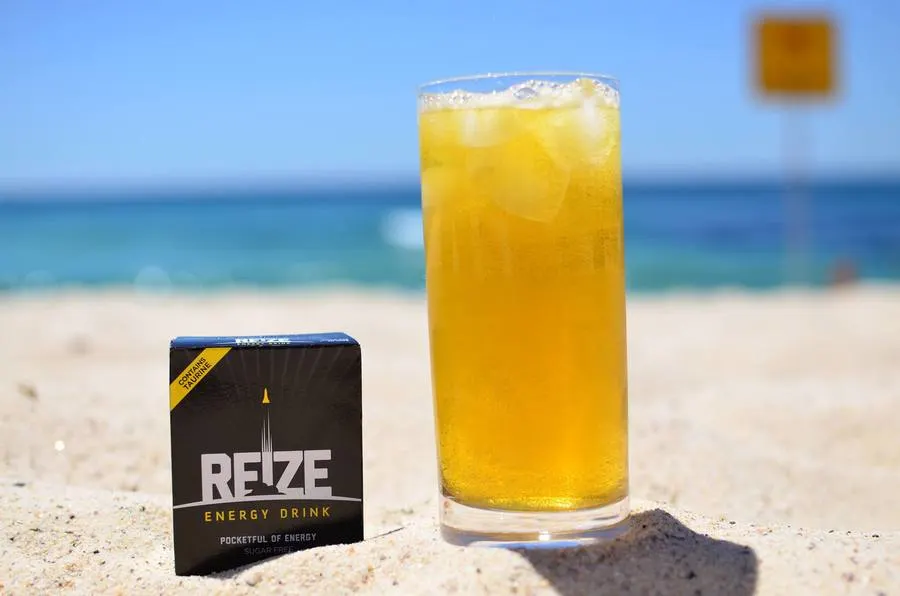In this article, I’ll discuss the Mountain Dew Kickstart, its ingredients, and how it affects you when consume this energy drink.
Mountain Dew Kickstart is a popular choice among Mountain Dew fans. It is one of PepsiCo’s most successful beverages and is also popular among energy drink lovers in many parts of the world.
A 16 fl. oz can of Mountain Dew Kickstart contains 80 calories, 90mg of caffeine, and 20g of sugar.
Keep reading to learn more!
Mountain Dew Kickstart Nutrition Facts
I have created this table to compare and contrast Mountain Dew Kickstart with Game Fuel and Bang Energy.
| Typical Value (Standard Serving) | Mountain Dew Kickstart (16 fl. oz) | Game Fuel (16 fl. oz) | Bang (16 fl. oz) |
| Energy | 80 calories | 90 calories | 0 calories |
| Protein | 0g | 0g | 0g |
| Carbohydrate (Of which sugars) | 21g (20g) | 24g (23g) | 2g (0g) |
| Sodium | 170mg | – | 10mg |
| Caffeine | 90mg | 90mg | 200mg |

Mountain Dew Kickstart Calories
A 16 fl. oz can of Mountain Dew Kickstart contains 80 calories.
Considering that the daily calorie limit for healthy adults is 2000 to 2400 calories for women and 2400 to 3000 calories for men, Mountain Dew Kickstart’s calorie content seems like an acceptable amount.
Drinking one can of Mountain Dew Kickstart isn’t going to drastically impact your daily calorie count. If you need to burn some calories during exercise, Mountain Dew Kickstart is probably a great go-to for that.
However, if you have a relatively sedentary lifestyle, perhaps Mountain Dew Kickstart isn’t the best choice as the calories could add up and you may not burn them all off without consistent physical activity.
If you prefer your energy drinks to be calorie-free, you should check out my article about the best zero-calorie energy drinks for some recommendations that might be more up your alley.
Mountain Dew Kickstart Ingredients
Here’s a quick list of Mountain Dew Kickstart’s ingredients:
- Carbonated Water
- High fructose corn syrup
- White grape juice concentrate
- Citric acid
- Sodium polyphosphates (preservative)
- Natural flavor
- Potassium sorbate (preservative)
- Caffeine
- Potassium Citrate
- Potassium chloride
- Gum Arabic
- Acesulfame potassium (artificial sweetener)
- Sucralose (artificial sweetener)
- Red 40 (coloring)
- Calcium disodium EDTA
- Sucrose acetate isobutyrate
- Salt
- Blue 1 (coloring)
Caffeine
Each 16 fl. oz can of Mountain Dew Kickstart has 90mg of caffeine, which I find to be an ideal amount.
Given that energy drinks of the same liquid volume as Mountain Dew Kickstart generally contain as little as 50mg to as much as 300mg of caffeine.
I usually try to have 50 to 100mg of caffeine per drink, as I find that amount sufficient to give me a smooth boost without overwhelming me with side effects from too much caffeine.
So, Mountain Dew Kickstart fits right into my preferred sweet spot in terms of caffeine content.
That said, whether 90mg of caffeine is enough to give you the boost you’re looking for or not depends on your individual caffeine metabolism.
For example, if you’re a veteran caffeine drinker, the caffeine present in one can of Mountain Dew Kickstart might not be enough for you and you may not feel the effects as strongly. So you might prefer an energy drink with a higher caffeine content instead.
However, it’s important to control how much caffeine you consume in a single day to avoid any potential negative effects.
For reference, the FDA recommends a maximum caffeine intake limit of no more than 400mg a day for healthy adults. Excessive consumption of caffeine could lead to notable side effects like:
- Anxiety
- Insomnia
- High blood pressure
- Fatigue
- Rapid heart rate
- Muscle breakdown
Remember, moderation is key. As long as you consume Mountain Dew Kickstart in moderation and adjust your intake according to your personal limits, you should be safe from any potential adverse effects.
Sugar

A 16 fl. oz can of Mountain Dew Kickstart contains 20g of sugar.
Now:
20g of sugar is still within the recommended intake per day. However, it can potentially lead to health problems when consumed long term.
As a guide, the recommended maximum daily sugar limit according to the AHA is no more than 25g for women and 36g for men.
With 20g of sugar, Mountain Dew Kickstart is pretty close to the recommended limit for women and above half for men. So, while one can of Mountain Dew Kickstart won’t overshoot the daily limit, two cans definitely will.
Though indulging in sugar every once in a while is perfectly fine, having too much sugar day after day can cause a number of health problems in the long term such as:
- Weight gain
- Diabetes
- Heart disease
- Increased risk of depression
- Cavities
- Increased risk of kidney disease
Besides that, high consumption of sugar in a short time can also lead to a sugar crash, which will leave you feeling tired and sluggish from the sudden spike and drop in your blood sugar levels.
Therefore, if you want to avoid these unpleasant side effects, stick to only one can of Mountain Dew Kickstart per day.
Artificial Sweeteners
In addition to having 20g of regular sugar, Mountain Dew Kickstart also has artificial sweeteners, namely sucralose and acesulfame potassium.
Both of these sweeteners are calorie-free sugar substitutes and thus won’t drastically affect your daily calorie count or overall diet.
Since these sweeteners are sweeter than regular sugar, Mountain Dew Kickstart tastes pretty sugary given that there’s already sugar in the list of ingredients too.
While artificial sweeteners are approved by the FDA and safe for use, there are still many things we don’t fully understand about these sweeteners and their potential long-term effects.
Of course, provided that you aren’t including sucralose and acesulfame potassium in every single one of your meals, you should be safe from any of their potential negative impacts.
High Fructose Corn Syrup
High fructose corn syrup (HFCS) comes from corn starch and is found in many of our daily foods and drinks like soda, crackers, condiments, and packaged fruits. It’s quite similar to sugar since it’s very sweet and consists of fructose and glucose.
Many health agencies, including the FDA, have expressed concern that there is a link between high fructose corn syrup and a variety of health problems such as diabetes and metabolic dysregulation.
However, results regarding the relationship between this sweetener and potential health issues are inconclusive.
The best way around this problem is to only consume high fructose corn syrup in moderation and have a balanced diet.
Potassium Chloride
Potassium chloride is a flavor enhancer and stabilizing agent in foods and drinks. Its main functions are to supply potassium enrichment and reduce the amount of sodium in our foods and beverages.
In short, potassium chloride helps these products, including energy drinks like Mountain Dew Kickstart to maintain their taste and flavor.
Citric Acid
Citric acid is a flavoring and preserving agent that tastes sour and is acidic in nature. Citric acids are derived from citrus fruits like lemons, limes, oranges, and tangerines.
Some of the products that we regularly consume that contain citric acid are sodas, juices, energy drinks, candies, and frozen foods.
What makes Mountain Dew Kickstart an energy drink?
Even though it is not advertised as an energy drink, many still consider Mountain Dew Kickstart to be one. This is because it contains just enough caffeine to give you a boost in energy.
Kickstart only has about 90mg of caffeine in it however has about 20 grams of sugar. Compared to other brands the sugar content is typically lower while caffeine reaches up to 300mg.
With the caffeine content, Kickstart will surely help keep you awake. All the while giving you that needed push for your day.
Advertised as a replacement for juice or coffee, Kickstart will surely boost your energy a bit. Nevertheless, its effect is limited to its moderate caffeine levels.
Is Mountain Dew Kickstart Good For You?
Mountain Dew Kickstart is one of the better energy drinks, with a reasonable amount of caffeine and sugar that are within the recommended health guidelines. So while Mountain Dew Kickstart isn’t bad for you, it’s not exactly particularly good for you either.
Mountain Dew Kickstart does work as an energy drink, and will definitely supply you with a nice boost for improved physical or mental performance.
Caffeine is known to improve physical performance, and there are many studies that support this claim too.
A 2016 study reported that the running performance of 18 participants significantly increased after the ingestion of a caffeinated energy drink.
Aside from exercise performance, caffeine can also enhance brain functions, namely reaction time, concentration, and memory.
Anyhow, you should always limit your consumption of Mountain Dew Kickstart and take note if you have caffeine sensitivity so you can adjust your limits accordingly.
If you’re looking for a truly healthy beverage, choose water. Just because some energy drinks aren’t overly bad for you, that doesn’t mean that they are particularly good for you either.
How Long Does It Take For Kickstart To Kick In?
Mountain Dew Kickstart will take approximately 10-15 minutes to kick into your system before you start to feel an energy lift. It will take about 30-45 minutes for the effects to reach their peak and that’s when you’ll really feel the full effects.
Caffeine has a half-life of around 5-6 hours.
This means that 5 hours after drinking a can of Mountain Dew Kickstart, there would still be about 45mg of caffeine in your bloodstream. Although this amount isn’t large, if you’re sensitive to caffeine, you might still feel the effects strongly.
This is the reason why you hear many people saying not to drink anything with caffeine close to your bedtime, as it can affect your sleep cycle and cause you difficulty sleeping at night.
Is Mountain Dew Kickstart Or Coffee Better?
In terms of ingredients, Mountain Dew Kickstart and coffee are fairly different, aside from the fact that both have caffeine and sugar. Hence, whether Mountain Dew Kickstart or coffee is a better choice depends on what you’re looking for.

For starters, the taste of Mountain Dew Kickstart and coffee differ greatly.
If you find the aroma and taste of coffee comforting, Mountain Dew Kickstart may not be your cup of tea. On the other hand, if you like sweet things and don’t love the taste of coffee, Mountain Dew Kickstart is a great choice.
Besides that, coffee is a beverage that you can savor slowly while Mountain Dew Kickstart is more suitable for a quick chug since it’s designed to energize you within minutes.
In terms of ingredients, Mountain Dew Kickstart contains fruit concentrates, sodium, and a lot of other flavorings and preservatives that you won’t find in coffee. On the flip side, coffee is freshly made from natural ingredients and contains a lot of antioxidants that you won’t find in Mountain Dew Kickstart.
So, it’s really a personal preference for you to decide which beverage is better depending on your taste, preferences, and what you’re hoping to get out of the drink in the first place.
Or, for a deeper discussion about whether coffee or energy drinks are the better choices, check out this comprehensive article that I wrote that covers everything you need to know.
Does Mountain Dew Kickstart Have Side Effects?
While having a can of Mountain Dew Kickstart occasionally won’t cause any notable side effects, frequent excessive consumption of Mountain Dew Kickstart may eventually lead to unwanted health issues in the long term.
The caffeine content in Mountain Dew Kickstart may not be as high or as strong as other energy drinks like Bang and Reign, but if you don’t control your intake, you could easily exceed the recommended caffeine limit.
Sure, the effects might not be immediate, but if you wait until you feel restless or nauseous, you’ve probably already drunk way too much caffeine by then.
Plus, a high intake of caffeine on a consistent basis can lead to caffeine addiction, which is pretty difficult to shake.
Furthermore, a single can of Mountain Dew Kickstart contains a considerable amount of sugar. As you probably already know, having too much sugar can lead to plenty of unwanted health problems.
Sugar can also become addictive if you don’t consume it in moderation. The more sugar you eat, the more you’ll be craving for sugar in the future.
Like all energy drinks, the best way to avoid these side effects is to limit your intake of Mountain Dew Kickstart. As long as you aren’t having more than one can of Mountain Dew Kickstart every day, you should be perfectly fine.
If you’re concerned about how Mountain Dew Kickstart may potentially affect your health, you should consult a doctor before adding it to your daily diet.
Mountain Dew Kickstart Flavors
Here’s a quick list of the available flavors:
- Original Dew
- Orange Citrus
- Black Cherry
- Midnight Grape
- Fruit Punch
- Mango Lime
- Pineapple Orange Mango
- Blueberry Pomegranate
- Raspberry Citrus
Mountain Dew Kickstart discontinued/region-specific flavors:
- Ultra (sugar-free version)
- Blood Orange
- Watermelon
- Limeade (only available in Australia)
- Strawberry Kiwi
Mountain Dew Kickstart Alternatives
Mountain Dew Kickstart is great as a casual drink for an average energy boost, but here are other good alternatives if you’re open to trying something new:
- Celsius
- Game Fuel
- Reign
- Red Bull
- Bang
- Monster
- Xtend
- 3D Energy
- Xyience
- Rockstar
- C4 Energy
- AMP Energy
- Raze Energy
- Adrenaline Shoc
Powdered energy drinks are great too since they’re usually much more affordable and easier to transport:
- Zipfizz
- Advocare Spark
- G Fuel
- REIZE (my fav)
REIZE (10 Out Of 10)

While Mountain Dew Kickstart can give you a sense of familiarity with its similar taste to regular Mountain Dew, REIZE is definitely a cut above the rest, in my opinion.
REIZE is a great powdered energy drink that comes in light 4g sachets, which are convenient to carry around wherever you’re headed.
REIZE has a sensible 50mg of caffeine and is completely sugar-free. Unlike Mountain Dew Kickstart, REIZE won’t affect your daily calorie count since it has just 11 calories per serving.
Furthermore, REIZE comes packed with a special blend of smart ingredients like taurine, ginseng, and B vitamins, all of which combine to provide you with the perfect energy boost without the dreaded sugar crash.
The best part?
REIZE ships straight to your door for only about $1 per drink, including shipping.
That’s amazing value for money and a lot more affordable than Mountain Dew Kickstart.
Give REIZE a try today, and you might also find that it’s the perfect pick-me-up to kick-start your day.
Other Articles
- Can you drink Mountain Dew Kickstart every day?
- Bang Vs Reign (which is better?)
- Is Mountain Dew Kickstart Vegan?
- Strongest energy drinks (ranked)

